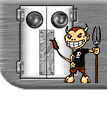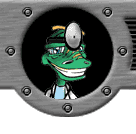P
|
The child begins to look more mature and and be described as a big
boy or big girl.
Large
muscle control and a sense of body ownership contribute to the physically
active stance of this age child.
Sexual
awareness becomes more prominent and may be discussed with those
of the opposite sex.
There
are frequent minor ills-eyes hurt when reading, dizzy when running,
wrists hurt during penmanship...
There
is increased interest in the workings of the body.
The
child may turn to books to learn about sex, organs, menses, etc.
Curiosity is common and often leads to active pursuit of answers.
There
may be some interest, though fleeting, in sex roles and clothing,
actions, etc.
|
E
|
Industry
vs. Inferiority
Child
feels and expresses a sense of personal dignity and self responsibility.
"Worrying"
begins to occur.
Tensional
outlets increase again - fidgeting, biting nails, fussing with hair.
Child
is less likely to stutter, but mutters and complains in under tones.
Awareness
of others becomes more acute.
At
five the child could verbalize nonverbal signals of joy and pleasure,
at seven anger pain and scorn are noticed, while fear and surprise
are added by nine years of age, with real awareness that others
have the same sets of emotions and needs s/he feels.
Adults
are seen as people for the first time in the sense of having emotions
and needs. (Parents are usually not).
|
P
|
The child usually has a fair understanding of right and wrong by now.
S/he
tends to tell the truth unless a lie will help to escape punishment
-- and when lying, there is a true awareness.
Praise
for efforts is desired and usually effective for improving performance.
There
is a tendency toward accepting responsibility and expressing guilt
for wrongdoing and error.
Jobs
and responsibilities are accepted, but the child tends to procrastinate
at this age, forgetting to perform agreed upon tasks.
The
child is less likely to tattle at this age to look superior to others.
Group
loyalty may begin to form.
|
S
|
The child is social and the referent switches more definitely to friends
and classmates.
Clubs
and belonging are a push and desire for the child - especially when
secret codes, messages, hand signals, etc. are part of the program.
The
child can be appealed to with respect to giving a fair hearing to
others' ideas.
Second
person perspective develops rapidly in this age range.
It
can be expected that the child will begin to show self reliance.
Being
"caught" performing may be embarrassing since a social consciousness
is developing.
Bossiness
is resented and eluded - especially from older sibs or students
who "grab" the reins.
|
I
|
Concrete stage is still most common and appropriate.
Conservation
of matter should be occurring.
Objects
have discrete identity even when discontinuous, for example, water.
Counted
numbers now make real sense - 1:1.
Rulers,
maps, distance begin to make real sense and the child can realistically
utilize devices in place of reality without losing sight of true
meaning.
Succession
and duration as functions of time begin to make sense.
Casual
relationships can be taught and understood in a rudimentary fashion.
Child
has dawning of not being "center of the universe."
|
















